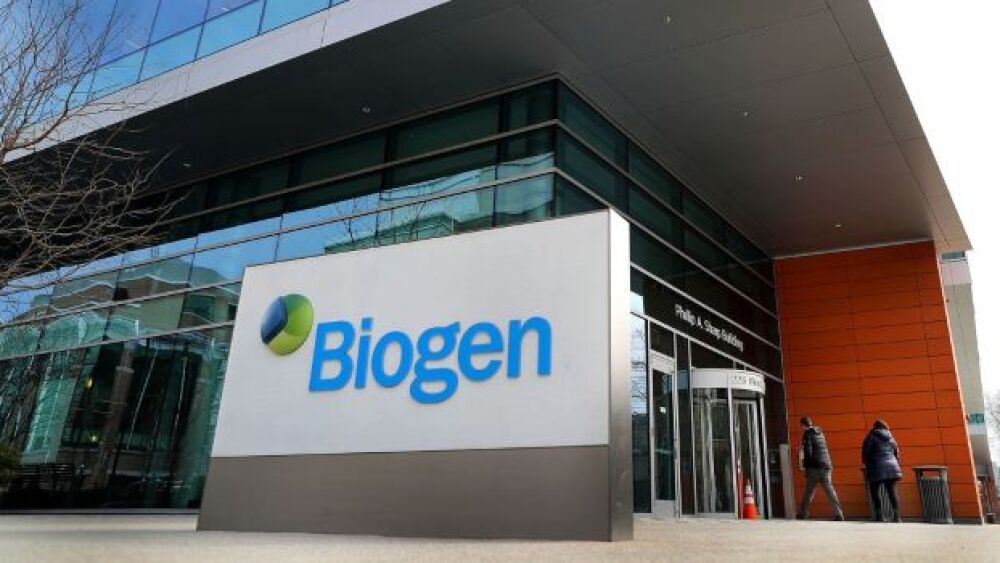Another drug Vounatsos heralded was zuranolone, which Biogen is developing with Sage Therapeutics for multiple forms of depression.
John Tlumacki/The Boston Globe via Getty
In the face of criticism and very slow uptake of its Alzheimer’s drug Aduhelm (aducanumab), Biogen is taking its defense to one of the biggest audiences in the biopharma industry, the annual J.P. Morgan Healthcare Conference. Company executives said they wanted to “improve the community’s understanding of the drug.”
Michel Vounatsos, chief executive officer of Biogen, did most of the talking, defending the drug’s potential to be the foundation of Biogen’s new neuroscience portfolio, while also noting that the company is creating “new franchises.” In addition to Aduhelm, Vounatsos said the company would depend on lecanemab, which demonstrated promising results in November 2021 in the Phase IIb 201 and open-label extension (OLE) studies. At that time, the OLE demonstrated clinical benefit in decreasing amyloid levels in the brain as early as three months and significant clearing in more than 80% of the trial participants by months 12 to 18. That drug is being co-developed by Biogen and Eisai, who are also partners on Aduhelm.
Another drug Vounatsos heralded was zuranolone, which Biogen is developing with Sage Therapeutics for multiple forms of depression.
“We expect two waves of growth,” Vounatsos said. “This starts now, with Alzheimer’s disease, and continues with depression. The delayed uptake of Aduhelm is a near-term challenge and establishing a leading Alzheimer’s franchise with lecanemab is our first priority. We are closely monitoring market advances and will remain dynamic and flexible.”
The Biogen chief also defended the clinical efficacy of Aduhlem. The drug was approved in June 2021 under an Accelerated Approval pathway, which depended upon biomarkers, rather than clinical effectiveness. It was deemed to be effective at clearing amyloid beta plaques from Alzheimer’s patients, which is one of the two abnormal proteins that accumulate in the brains of these patients. The other is tau. Vounatsos said, “Aduhelm impacts the underlying pathophysiology of Alzheimer’s disease.”
He did not focus on whether clearing those plaques actually results in improved cognition or memory, which has been one of the major criticisms of the drug. As part of the Accelerated Approval, Biogen is required to run a Phase IV confirmatory trial for the drug and expects to screen the first patient in May 2022.
Much has been made of the company’s third-quarter 2021 report, where it reported $300,000 in sales of Aduhelm, dramatically lower than the original analyst average estimates of $10.79 million. The company recently cut the price of the drug in half, to about $26,000 per patient per year, and notes that it has been dosed at 220 clinical sites around the U.S. In addition, Vounatsos indicated that more patients have used the company’s amyloid beta cerebrospinal fluid testing program. The company hopes that by cutting the price it could get another 50,000 patients to try the drug this year, a decision Vounatsos describes as “courageous,” adding, “We decided to take our destiny in our hands and be proactive.”
The U.S. Centers for Medicare and Medicaid Services is expected to provide a preliminary decision on national coverage for Aduhelm this week, with a final decision likely in March. Insurers will use that decision to decide whether to reimburse for the drug. So far, many large insurers have been reluctant to pay for it, with some even calling Aduhelm experimental, despite FDA approval.
But Biogen hasn’t put all its eggs in the Alzheimer’s basket. It is still a major player in the multiple sclerosis market, has an effective drug for Spinal Muscular Atrophy (SMA) and expects, if trials go well, to submit a New Drug Application to the FDA later this year for zuranolone for major depressive disorder followed by an NDA for postpartum depression. It also is strengthening its presence in the biosimilars market.





